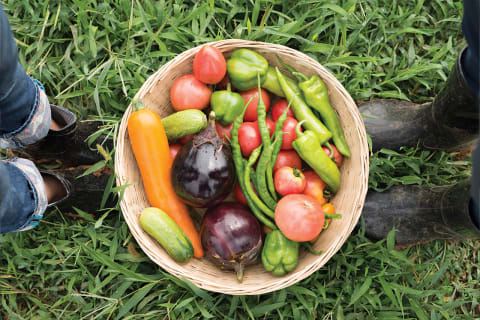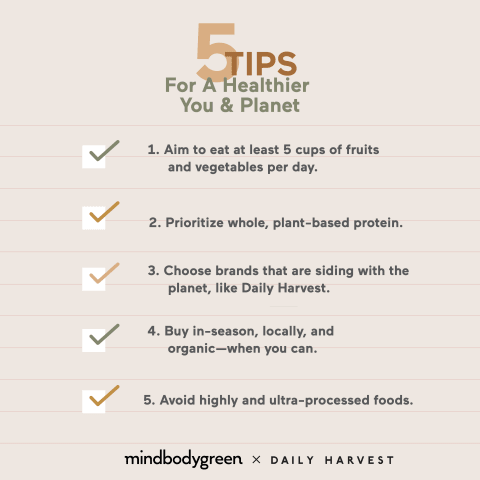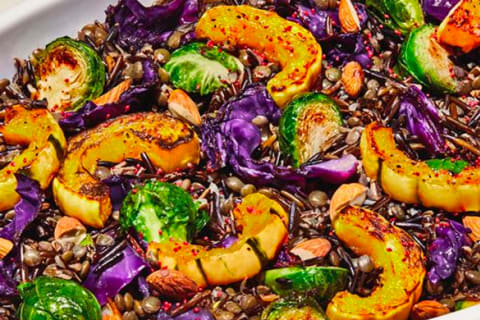Advertisement
Eat Your Way To A Healthier You & Healthier Planet With These 5 Tips

As human beings living in an era of environmental crisis, we have a lot on our hands. Not only are we managing the daily demands of our own health, but we're tasked with restoring the greater health of the planet. But the thing is, they're one and the same: The state of the planet and our own well-being are inseparable. And lucky for us, it's possible to nurture both—all in the same bite.
Eat the solution.
There are a lot of ways our planet needs urgent attention, and we hear about them every day. Soil depletion, harmful pesticides and chemicals, the mistreatment of small farms, plastic pollution, global warming, deforestation, and beyond—we all want these crises to end, but where to begin? At the individual level, one of the simplest ways we can support the planet comes down to something we do daily: eating.
Our modern food system is overdue for a transformation. (Let's say goodbye for good to standard practices like synthetic chemicals in our food and overfarming.) The foods we choose are a part of getting that change off the ground, the end result being a healthier planet and you. For example, just by eating more plants, you can help cut your carbon footprint by a third and add more healthy minutes to your life. Even better, these food choices can be delicious and convenient—proven by Daily Harvest. Alongside efforts to make organic fruits and vegetables more accessible, this food company is invested in helping to create a more sustainable food system.
Because no matter how you slice it, food is fundamental to living our best lives. So here are five ways to eat your way to a healthier you and a healthier planet!
1. Aim to eat at least 5 cups of fruits and vegetables per day.
The amount of fruits 'n' veggies we should consume in a day has long been under debate. But a recent study has cut through the noise: Five cups of fruits and vegetables per day is associated with lower mortality. While benefiting our health, a diet rich in diverse plants also supports the health of our planet as biodiversity is known to improve soil health. With an assortment of Smoothies, Flatbreads, their new Harvest Bakes, and more, eating more plants is easy with Daily Harvest. If you've yet to experience just how convenient (and delicious) positive change can be, just wait until that Strawberry + Peach smoothie lands on your doorstep.
2. Prioritize whole, plant-based protein.
Considering global livestock is responsible for 14.5% of human-related greenhouse gas emissions, one of the most impactful ways we can promote the health of our body and planet is by choosing more plant-based sources of protein. This doesn't mean you have to go completely plant-based tomorrow—but adding a few more meatless meals to your diet can help contribute to a sustainable future of food. Think black beans and lentils as an alternative to ground beef.
3. Choose brands that are siding with the planet, like Daily Harvest.
These days, eating healthfully and standing up for the planet isn't always crystal clear. As consumers, we have to be on the lookout for greenwashing and empty promises. Be conscious of which companies and brands you support, and choose those with specific initiatives that have the well-being of you and the planet in mind—whether that's regenerative farming, sustainable packaging, community giveback programs, and the like. Daily Harvest is a perfect example. Not only are sustainable sourcing, organic farming, and biodiversity fundamental to the brand's DNA, but their food is delicious and nutritious. It's not just the Squash + Wild Rice Gratin Harvest Bake rocking your taste buds… There's something about sustainability that just tastes better.
4. Buy in-season, locally, and organic—when you can.
Eating seasonally is exactly how it sounds: Aligning the foods you purchase and consume with what is currently in season. If this is impossible, prioritize frozen foods that are frozen at peak nutrition. This provides our body with the nutritional variety necessary for a well-rounded diet but can also reduce environmental impact1. Fruits 'n' veggies that are in season, as well as local, often require less transportation—leaving less of a footprint in terms of fuel and pollution. Plus, shopping organic is another way to support our body and the planet. Organic farming ensures that our food isn't grown with synthetic pesticides and other unsustainable practices while supporting soil quality and reducing pollution.

5. Avoid highly and ultra-processed foods.
Generally speaking, processed food has undergone some kind of change from its original form. Ultra-processed foods2 are processed foods that go through additional layers of processing to include added flavors, sugars, fats, and chemicals. We're all well aware that these foods aren't great for our individual health—they're repeatedly associated with chronic disease and higher mortality risk3. But a recent study also proved that a diet high in ultra-processed food also negatively affects the planet4.
Healthier you, healthier planet. It is that simple.
Between growing environmental concerns and the day-to-day tasks of staying healthy, change can feel overwhelming. Transforming the food system? Maybe that's daunting. But the reality is, there are simple actions we can take to benefit our body and planet simultaneously—like watering two plants with one hose. Whether it's stocking your freezer with Daily Harvest or taking on these five tips, the smallest steps add up to the greatest change. So let's get cooking!
Screenshot the checklist below to keep these tips top of mind!


Why Nutrition Is Key To Changing Your Relationship With Alcohol
Brooke Scheller, DCN, CNS

Why Alcohol Sabotages Your Gut Health & How To Get Back On Track
Brooke Scheller, DCN, CNS

Why Nutrition Is Key To Changing Your Relationship With Alcohol
Brooke Scheller, DCN, CNS

Why Alcohol Sabotages Your Gut Health & How To Get Back On Track
Brooke Scheller, DCN, CNS

Why Nutrition Is Key To Changing Your Relationship With Alcohol
Brooke Scheller, DCN, CNS

Why Alcohol Sabotages Your Gut Health & How To Get Back On Track
Brooke Scheller, DCN, CNS

Why Nutrition Is Key To Changing Your Relationship With Alcohol
Brooke Scheller, DCN, CNS

Why Alcohol Sabotages Your Gut Health & How To Get Back On Track
Brooke Scheller, DCN, CNS

















